
 ICCF NEWS ICCF NEWSClick here for more news on the ICC Foundation. |
 ICC-ES NEWS ICC-ES NEWSClick here for more news on the ICC Evaluation Service. |
 IAS NEWS IAS NEWSClick here for more news on the International Accreditation Service. |
 ICC CHAPTERS & REGIONS NEWS ICC CHAPTERS & REGIONS NEWSClick here for more news on ICC Chapters and Regions. |
 ICC GOVERNMENT RELATIONS NEWS ICC GOVERNMENT RELATIONS NEWSClick here for more news on ICC Government Relations. |
 ICC EDUCATION & CERTIFICATION NEWS ICC EDUCATION & CERTIFICATION NEWSClick here for more news on ICC Education, Certification and Testing. |
ANSI Approves Next Generation of the ICC 700 National Green Building Standard
The National Association of Home Builders (NAHB) and the International Code Council (ICC) applaud the recent approval of the 2012 ICC 700 National Green Building Standard. In 2007, NAHB and the ICC partnered to establish a nationally recognizable standard definition of green building. The resulting ICC 700 National Green Building Standard is the first and only residential green building rating system to undergo the full consensus process and receive approval from the American National Standards Institute (ANSI). This is the first time the standard has undergone Consensus Committee review and update since it was published in 2009. "The introduction of the 2012 National Green Building Standard is a huge deal for our industry," said NAHB Chairman Barry Rutenberg, a home builder from Gainesville, Fla. "Not only does the updated version raise the bar on energy efficiency requirements, but it also completely revolutionizes how renovations and remodeling projects are treated under the standard. The 2012 updates make the standard easier to understand and implement, and we expect that this will certainly help to build upon the momentum we are already seeing in green building across the residential building industry." To date, the standard has been widely implemented throughout the industry. The NAHB Research Center, which serves as the secretariat of the standard as it progresses through ANSI, has certified the compliance of thousands of dwelling units and developed lots to the ICC 700. Dozens of regional and local green initiatives refer to the standard within their program criteria. The International Green Construction Code (IgCC) requires compliance with the ICC 700 if a jurisdiction chooses to regulate residential buildings four stories or less in height, except that Group R-1 residential occupancies of all heights are always required to comply with the IgCC. "ANSI's approval of the 2012 ICC 700 National Green Building Standard reinforces the quality and transparency of the process used to develop this important standard for constructing green residential buildings across America," said International Code Council Board President Ronald Piester and CEO Dominic Sims in a joint statement. "We are proud to develop the codes and standards that ICC and NAHB Members use to guide the construction of safe, sustainable and affordable homes, and provide an opportunity for ICC Members to play a vital role in this important undertaking." The new version of the standard includes several important changes including: |
||||
|
||||
| On Wednesday, Jan. 23, "Green Day" at the International Builders' Show in Las Vegas, NAHB and the ICC will release additional information on what changes the 2012 standard entails. Attendees of the show can hear the details during a press conference at 9:30 a.m. that day. To order the standard from ICC, please visit www.iccsafe.org/700_2012_NR, or call 800-786-4452. |
||||
| Back to top |
 |
| ICC, UL to Collaborate on New ANSI Standard for Landscape Irrigation Controllers Public invited to join industry professionals in ICC/UL standard development. 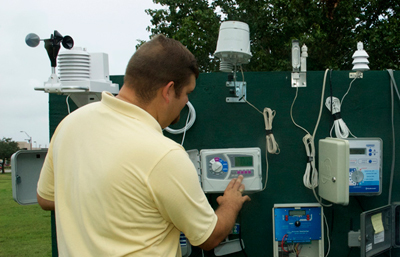 The International Code Council (ICC) and Underwriters Laboratories Inc. (UL) jointly will develop a new ANSI standard—Devices to Control and Operate Automatic Landscape Irrigation Systems—to ensure the basic safety and function of landscape irrigation controllers. UL and ICC will invite industry stakeholders and the public to participate in the standard's development and apply to be part of UL's Technical Panel. The panel will be responsible for the development of the new standard. The International Code Council (ICC) and Underwriters Laboratories Inc. (UL) jointly will develop a new ANSI standard—Devices to Control and Operate Automatic Landscape Irrigation Systems—to ensure the basic safety and function of landscape irrigation controllers. UL and ICC will invite industry stakeholders and the public to participate in the standard's development and apply to be part of UL's Technical Panel. The panel will be responsible for the development of the new standard.The new standard will complement and support landscape irrigation provisions found in the 2012 International Green Construction Code (IgCC) other codes, standards, rating systems and local legislation, according to ICC Senior Vice President of Technical Services Tom Frost, and ICC Executive Vice President and Director of Business Development Mark Johnson. "UL looks forward to working with ICC and the residential sprinkler controller industry, each bringing the strengths and knowledge necessary to develop a joint standard for residential sprinkler controllers that will complement codes," said Don Snyder, Director of Standards for UL. The standard, in part, will address the importance of safety in electrical devices in landscape irrigation controllers. The new standard will establish a basis to ensure the safety, function and durability of common electrical devices. Interested stakeholders can get involved in the process through the development and review of draft documents, providing feedback and participating in working groups. Those who serve on the Technical Panel will also be able to vote on ballots for the final approval of the new ANSI standard. "Most participation will take place online or via conference calls, along with in person meetings," said Deborah Prince, Standards Technical Panel (STP) Chair at UL. "In the next couple of months we will hold our joint standards technical panel kick-off meeting." To be included on the contact list or to apply to participate in the Technical Panel, contact Prince at deborah.r.prince@us.ul.com or (919) 549-1460. |
| Back to top |
ICC Announces Next Step in Commitment to Water Efficiency
|
| Back to top |
Atlantic City Ready to Host 2013 Annual Conference |
| Back to top |
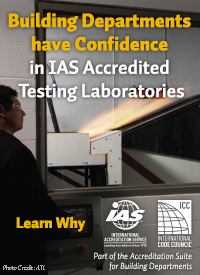 |
 |
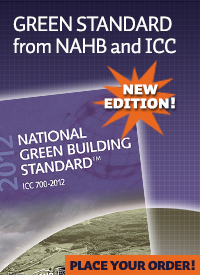 |
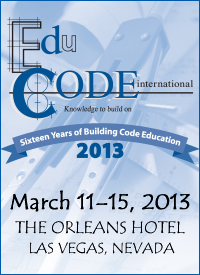 |
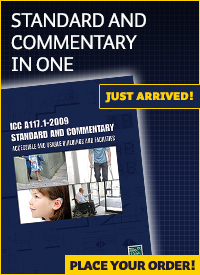 |
||||||
12 Earn Coveted ICC Master Code Professional Status Twelve individuals earned Master Code Professional (MCP) certifications in the fourth quarter of 2012, joining 34 code enforcement officials last year and more than 775 overall who have earned the Code Council's highest certification since 2004. |
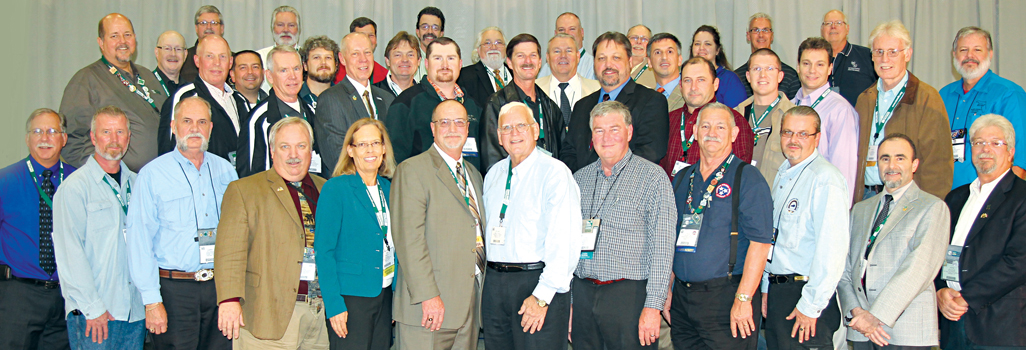 |
| Master Code Professionals at the Code Council's 2012 Annual Conference in Portland, Oregon. These dedicated men and women demonstrate commitment to the profession through achievement of this high level of certification. |
| Back to top |
| In Other ICC News |
| Code Council Annual Report Available |
| New Code Council Online Store Launched |
| ICC, NASFM Offer Crowd Manager Training |
| Back to top |
 |
 |
 |
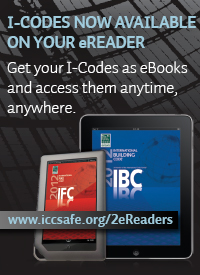 |
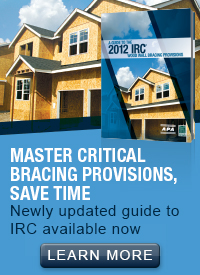 |
||||||
 |
 |
| For decades, the ICC Evaluation Service (ICC-ES) has been the industry leader in performing technical evaluations for code compliance, providing regulators and construction professionals with clear evidence that products comply with codes and standards. Having completed hundreds of evaluations of building products, components, methods and materials, ICC-ES has a proven track record of excellence in product evaluations. This record extends to reports regarding sustainability under standards such as the California Green Building Standards Code (CALGreen), the International Green Construction Code (IgCC) and other green rating systems. |
New ICC-ES Expedited Service Earns Positive Response ICC Evaluation Service (ICC-ES) applicants and clients have been quick to take advantage of the recently introduced ICC-ES Expedited Service—a service developed to meet their growing market entry needs. ICC-ES clients that qualify for this program can expect turnaround times of no more than six months for new report applications and no more than three months for revisions. Reports evaluated under this service are designated as priority projects and include the same thorough technical evaluation in a condensed amount of time with one main point of contact. |
| Back to top |
 |
ICC-ES PMG offers Free Product Listing to the Requirements of UPC-India Plumbing product manufacturers wanting to distribute in India are eligible for a free ICC-ES Plumbing, Mechanical and Fuel Gas (PMG) Listing to the UPC-India when they list their products with ICC-ES to the requirement of the U.S. Plumbing Codes, or transfer an existing listing to ICC-ES. This new program will allow manufacturers to expand into the growing plumbing products market in India. |
| Back to top |
Agenda Items for the February ICC-ES Evaluation Committee Meeting The ICC-ES Evaluation Committee will meet February 12-14 in Birmingham, Ala., to consider new proposed acceptance criteria (AC) for alternate products and for products where additional clarification is needed in the code; and for existing criteria that need to be revised to reflect current code, updated standards or changes to products. Seventeen separate AC items will be considered, with topics ranging from Proprietary Wood Preservative Systems to Fasteners Power-Driven into Concrete, Steel and Masonry Elements. |
| Back to top |
Register for the Free Webcast of the February Evaluation Committee Meeting ICC-ES will present a live webcast of its February Evaluation Committee meetings to allow industry professionals to view live video from the hearings and to bring the acceptance criteria process to those who could not attend in person and wanted to view discussions of pertinent agenda items. People who view the live webcasts range from engineering professors and students to international guests. |
| Back to top |
Recently Published ICC-ES Evaluation Reports ICC-ES Evaluation Reports are the leading building industry resource to verify that innovative building products, systems and materials are up to code. ICC-ES Evaluation Reports on code compliance provide comprehensive technical evidence that products and systems meet code requirements. Parkland Plastics, Inc.; Hunter Panels, LLC; MKT-Metall-Kunststoff-Technik GmbH & Co. KG; GAF; W.R. Grace & Co; Hexcel Corp.; Omega Products International, Inc.; Hal Industries, Inc.; and Boral Roofing, LLC are just a few companies that received ICC-ES Evaluation Reports in December 2012. |
| Back to top |
| In Other ICC-ES News |
| Earn CEUs—Attend the Free ICC-ES Webinar: Approving Innovative Building Products |
| Video: How to Read ICC-ES Evaluation Reports |
| Visit ICC-ES at the NAHB International Builder's Show, World of Concrete and the International Roofing Expo |
| Back to top |
 |
 |
| The International Accreditation Service (IAS) provides objective evidence that an organization operates at the highest level of ethical, legal and technical standards. IAS is a nonprofit, public-benefit corporation that has been providing accreditation services since 1975. IAS accredits a wide range of companies and organizations, including governmental entities, commercial businesses and professional associations. IAS accreditation programs are based on recognized national and international standards that ensure domestic and/or global acceptance of its accreditations. |
ICC Global Members to Benefit from New Partnership with IAS International Code Council Members who reside and work outside of the United States will be better served by the association's recent move of its Global Services Division to the International Accreditation Service (IAS), an ICC subsidiary. ICC Global Services will be a distinct division within IAS. |
| Back to top |
 |
Federally Mandated Accreditation Stimulates Growth for IAS
|
| Back to top |
Technical Assessors Recruitment IAS is actively seeking and retaining contract technical assessors and experts that have experience in auditing the quality and technical processes of laboratories, inspection agencies, building departments and product certification agencies. Knowledge of ISO/IEC 17025 (testing and calibration), ISO/IEC 17020, ISO/IEC 17065, ISO/IEC 17021, measurement uncertainty, proficiency testing and IAS accreditation criteria is preferred. For more information or to apply, click here. |
| Back to top |
| In Other IAS News |
| IAS Develops Food Safety Management System Accreditation Program |
| Model Program for Special Inspection Updated |
| STAREGISTER Accredited to ISO 17024 by IAS |
| New and Updated IAS Accreditations |
| Back to top |
 |